Jennifer Boucher
-
- AWO ANNUAL Maritime Reporter, Mar 1992 #13
Legislative Challenges: AWO Takes Aim At Complex Issues The American Waterways Operators (AWO), founded in 1944, is the national trade association of the inland and coastal tug and barge industry, which operates a fleet of over 7,500 tugs and towboats and more than 30000 barges There are now unprecedented challenges for AWO as the association endeavors to cope with monumental legislation . . . the Oil Pollution Act, Clean Air Act amendments, Americans with Disabilities A c t . . .
which demonstrated a concerted effort by public officials to mandate a cleaner, safer, more equitable working environment, without substantial regard to cost or adverse economic impact. Inthepost-Valdez era, legislators have clearly been motivated more by the fear of a deteriorating environment than by the need for increased productivity and economic competitiveness, often resulting in rhetorical allegations and ill-conceived measures which have injurious potential for the industry.
AWO is faced with more numerous and complex issues than ever before. Statutorily driven regulations and legislative initiatives t h a t mandate changes in industry operations, personnel and resources, make it imperative that AWO maintain and improve open and effective communication with Congress, the Coast Guard, and related industry organizations.
AWO ventures to produce innovative strategies for ensuring the visibility of the industry and seeks to practice a modern and creative approach to advocacy in response to the emergence of bills, studies, and proposed rules t h a t will set the foundation for the new regulatory regime under which the barge and towing industry will be required to operate.
In 1991, AWO members felt the first shocks resulting from the passage of OPA 90 with the promulgation of several regulations by the Coast Guard which addressed oil spill liability, cleanup, and prevention requirements under the new law.
When the Coast Guard issued its proposed rulemaking to implement the OPA 90 financial responsibility requirements, a long-anticipated showdown between the Coast Guard, petroleum carriers, and the marine pollution insurance industry took on tangible form. Although certificates of financial responsibility were previously required under the Clean Water Act, the liability risks under OPA 90 are much greater. Moreover, because OPA 90 requires insurers to be guarantors and subjects them to direct action by claimants, the international, and possibly also domestic, insurers assert that they will not issue the required certificates to their insureds. As a result, AWO maintains that the Coast Guard's proposed regulations will, if implemented as proposed, shut down the waterborne movement of petroleum and emphasizes the need for exploring other regulatory mechanisms to demonstrate evidence of financial responsibility.
Congressional hearings held in November 1991 examined and confirmed the likelihood of a potential shutdown of fuels delivery and advised the Coast Guard that exploring other options would not violate Congress's intent and is, in fact, a necessity. The Coast Guard is required to develop a Regulatory Impact this year, which will assess the impact of vessel operators being unable to secure insurance coverage which meets the Coast Guard's proposed test of financial responsibility.
AWO will continue to assert that the rule is unworkable in current form and must be corrected to avoid severe disruptions in the transportation marketplace.
Another directive of OPA 90 took shape when, in August of 1991, the Coast Guard issued a preliminary regulatory proposal on tank vessel response plans and the carriage of oil spill cleanup and removal equipment.
AWO provided the agency with detailed industry views on these questions. The Coast Guard announced its intention to proceed with regulatory negotiation process to reach a consensus on a proposed regulation by March 1992. AWO challenged the need for the negotiated rulemaking on this issue and opposed the unbalanced composition of the proposed committee.
AWO began participation in the negotiation process early this year and assembled a small team of inland and coastal operators to assure accurate industry representation.
OPA 90 also mandates that the Coast Guard develop regulations to protect the environment until single hull vessels over 5,000 gross tons are phased out in the year 2010. The Coast Guard has proposed structural options include double sides, double bottoms, and protectively located segregated ballast tanks, which AWO rejected on the basis of economic and technical unfeasibility.
AWO prefers the option of instituting operational requirements, such as enhanced traffic control, training, and management standards, and emphasized the importance of viewing and tank barges separately when examining the feasibility of regulations.
AWO recently examined the effect of international operation and safety initiatives on domestic operators through an in-depth analysis of the structure, function, and operation of the International Maritime Organization, and its impact on the U.S. barge and towing industry. The AWO study concluded that the best strategy by which AWO might monitor and influence the work of the IMO is through ongoing informal consultation with the Coast Guard and participation in meetings held by the Shipping Coordinating Corn- mittee, which develops the U.S. position on issues before the IMO. The report also concluded that further development of a substantial IMO advocacy effort must be balanced against competing priorities within the industry.
Americans With Disabilities Act Because of the unique nature of marine operations and the physical and potentially hazardous risks posed by marine employment, the passage of the Americans with Disabilities Act of 1990 (ADA), and ensuing regulations by the Equal Employment Opportunity Commission, present new challenges for the industry in the realm of marine personnel policies. In order to ensure the best approach to effective implementation of the new regulations, which become effective in July 1992, AWO's task force on the ADA carefully examined the effects of the act on hiring procedures for marine personnel and addressed the possibility of an industry-wide response to the ADA. The association will hold a seminar on this vital topic on April 8, 1992, at the ANA Hotel in Washington, D.C., just prior to the AWO Annual Meeting, April 9-10.
Regional Environmental Challenges Still reeling from media and public outcry stemming from the Valdez spill, many legislators have been driven to propose short-sighted and potentially damaging measures, which are all too characteristic of the political motivations existing in a period preceding an election. The industry has been faced with an onslaught of such measures regarding personnel, pilot qualifications, and vessel navigation equipment requirements. These bills would essentially breach OPA 90 requirements for the completion of Congressionally mandated studies and, consequently, AWO opposes their passage and upholds the law's commitment to a comprehensive review of the issues.
Despite the onerous oil spill liability provisions in OPA 90, the lack of federal preemption of state oil pollution laws encouraged many individual states to develop statutorily strict environmental protection measures t h a t surpass federal regulations in areas such as unlimited natural resource damages, civil and criminal penalties, and financial responsibility. Marine transportation of petroleum products and chemicals was temporarily interrupted in 1991 in Florida waters as a result of state legislation prohibiting the acceptance of federal certificates of financial responsibility, until the industry was successful in getting the provision repealed to allow the federal certificate as acceptable evidence.
There are several other environmental challenges across the country.
Users of the Columbia-Snake River system, and the economy of the Pacific Northwest, are threatened by the destination of Sockeye salmon as an endangered species and related proposals to lower reservoir levels. Environmental groups elsewhere push for legislation to require state permitting programs that would limit hazardous cargo transportation and threaten the operation of single hull vessels on the Upper Mississippi. The Environmental Protection Agency has embarked on regulations mandated by the 1990 Clean Air Act amendments requiring the reduction of VOC emissions from tank vessel loadings and unloadings, raising questions about the scope of the rule's implementation and the relationship between federal and state enforcement authority. And, while Congress continued the controversial debate on wetlands regulation, the industry pushed for a balance between preservation and economic activity.
These legislative and regulatory initiatives produce unprecedented challenges for the association. As the government relentlessly attempts to increase its regulatory impact on the barge and towing industry, AWO has developed a contemporary approach to advocacy which will ensure the added visibility and access necessary to assure continued viable and safe marine transportation.
-
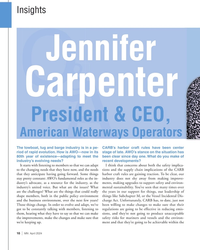 )
April 2024 - Marine News page: 10
)
April 2024 - Marine News page: 10Insights Jennifer QQQQQQQQQAAA & Carpenter President & CEO, American Waterways Operators The towboat, tug and barge industry is in a pe- CARB’s harbor craft rules have been center riod of rapid evolution. How is AWO—now in its stage of late. AWO’s stance on the situation has 80th year of existence—adapt
-
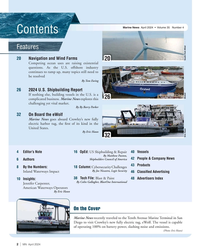 )
April 2024 - Marine News page: 2
)
April 2024 - Marine News page: 2Classi? ed Advertising 10 Insights: 38 Tech File: Blast & Paint 48 Advertisers Index By Colin Gallagher, BlastOne International Jennifer Carpenter, American Waterways Operators By Eric Haun On the Cover Marine News recently traveled to the Tenth Avenue Marine Terminal in
-
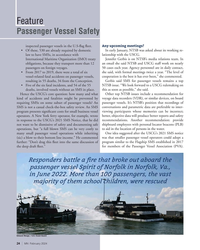 )
February 2024 - Marine News page: 24
)
February 2024 - Marine News page: 24was asked about its working re- law to have SMSs, in accordance with lationship with the USCG. International Maritime Organization (IMO) treaty Jennifer Gerbis is on NTSB’s media relations team. In obligations, because they transport more than 12 an email she said NTSB and USCG staff work on nearly
-
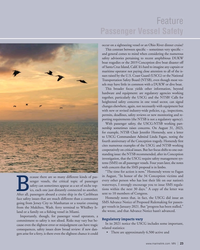 )
February 2024 - Marine News page: 23
)
February 2024 - Marine News page: 23a regulatory agency). With passenger safety, the USCG-NTSB working part- nership sometimes raises concerns. On August 31, 2023, for example, NTSB Chair Jennifer Homendy, sent a letter to USCG Commandant Admiral Linda Fagan, noting the fourth anniversary of the Conception tragedy. Homendy ? rst cites numerous
-
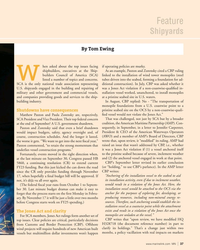 )
November 2023 - Marine News page: 37
)
November 2023 - Marine News page: 37. Con- at the end of September? A U.S. government shutdown. Paxton and Zorensky said that even a brief shutdown sequently, in September, in a letter to Jennifer Carpenter, would impact budgets, safety, agency oversight and, of President & CEO of the American Waterways Operators course, construction schedules
-
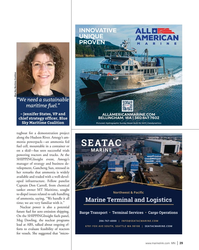 )
November 2023 - Marine News page: 29
)
November 2023 - Marine News page: 29Blue Sky Maritime Coalition “We need a sustainable maritime fuel.” – Jennifer States, VP and chief strategy of? cer, Blue Sky Maritime Coalition tugboat for a demonstration project along the Hudson River. Amogy’s am- monia powerpack—an ammonia fed fuel cell, mountable in a container or on a
-
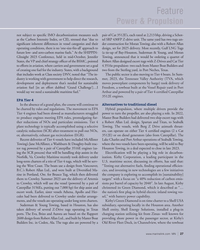 )
November 2023 - Marine News page: 27
)
November 2023 - Marine News page: 27low- and zero-carbon marine fuels.” At the SHIPPIN- (a tie-up of Bay-Houston, Suderman & Young, and Moran GInsight 2023 Conference, held in mid-October, Jennifer Towing, announced that it would be ordering a quartet of States, the VP and chief strategy of? cer of the BSMC, pointed Robert Allan designed
-
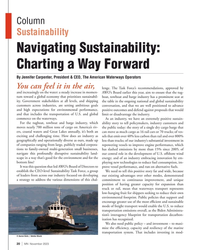 )
November 2023 - Marine News page: 20
)
November 2023 - Marine News page: 20Column Sustainability Navigating Sustainability: Charting a Way Forward By Jennifer Carpenter, President & CEO, The American Waterways Operators You can feel it in the air, lenge. The Task Force’s recommendations, approved by and increasingly on the water: a steady increase in momen- AWO’s Board
-
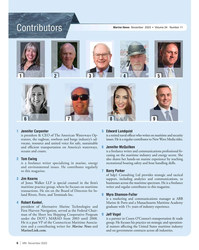 )
November 2023 - Marine News page: 6
)
November 2023 - Marine News page: 6Marine News November 2023 • Volume 34 Number 11 Contributors 1 24 35 7 6 8 9 1 Jennifer Carpenter 5 Edward Lundquist is president & CEO of The American Waterways Op- is a retired naval of? cer who writes on maritime and security erators, the tugboat, towboat and barge industry’s ad- issues.
-
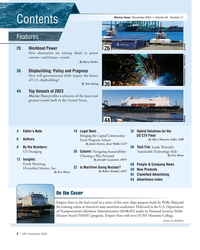 )
November 2023 - Marine News page: 2
)
November 2023 - Marine News page: 2US Dredging 20 Column: Navigating Sustainability: Sustainable Technology Hub By Eric Haun Charting a Way Forward By Jennifer Carpenter, AWO 12 Insights: Frank Manning, 58 People & Company News 22 Is Maritime Going Nuclear? Diversi? ed Marine
-
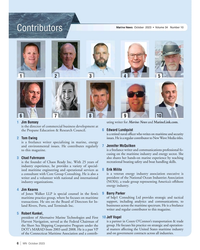 )
October 2023 - Marine News page: 6
)
October 2023 - Marine News page: 6regular contributor to New Wave Media titles. is a freelance writer specializing in marine, energy and environmental issues. He contributes regularly 7 Jennifer McQuilken to this magazine. is a freelance writer and communications professional fo- cusing on the maritime industry and energy sector. She 3
-
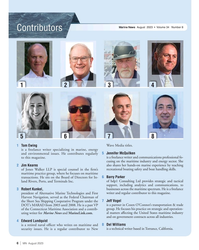 )
August 2023 - Marine News page: 6
)
August 2023 - Marine News page: 624 6 5 7 8 1 Tom Ewing Wave Media titles. is a freelance writer specializing in marine, energy and environmental issues. He contributes regularly 5 Jennifer McQuilken to this magazine. is a freelance writer and communications professional fo- cusing on the maritime industry and energy sector. She 2
-
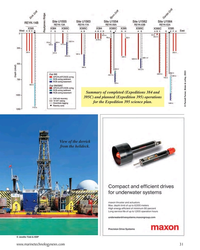 )
July 2023 - Marine Technology Reporter page: 31
)
July 2023 - Marine Technology Reporter page: 31(Expedition 395) operations for the Expedition 395 science plan. © Parnell-Turner, Briais & LeVay, 2023 View of the derrick from the helideck. © Jennifer Field & IODP www.marinetechnologynews.com 31 MTR #5 (18-33).indd 31 7/27/2023 3:37:24 P
-
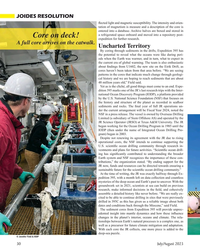 )
July 2023 - Marine Technology Reporter page: 30
)
July 2023 - Marine Technology Reporter page: 30as well as a precursor for future climate mitigation and adaptation. With each core the JR collects, one more piece is added to the deep-sea puzzle. © Jennifer Field & IODP 30 July/August 2023 MTR #5 (18-33).indd 30 7/21/2023 9:09:20 A
-
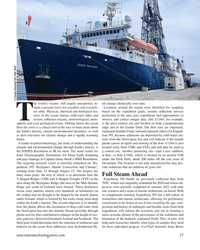 )
July 2023 - Marine Technology Reporter page: 27
)
July 2023 - Marine Technology Reporter page: 27learn more about ridge and in the Gardar Drift. The drift sites are important, the Earth’s history, current environmental dynamics, as well explained Jennifer Field, onboard outreach of? cer for Expedi- as their relevance for climate change and a rapidly warming tion 395, because sediments are deposited
-
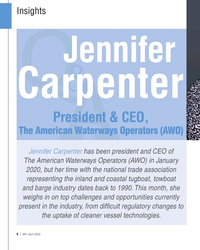 )
April 2023 - Marine News page: 8
)
April 2023 - Marine News page: 8Insights Jennifer QQQQQQQQQAAA & Carpenter President & CEO, The American Waterways Operators (AWO) Jennifer Carpenter has been president and CEO of The American Waterways Operators (AWO) in January 2020, but her time with the national trade association representing the inland and coastal
-
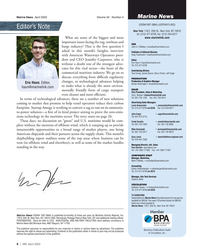 )
April 2023 - Marine News page: 4
)
April 2023 - Marine News page: 4Insights interview Publisher & Editorial Director Greg Trauthwein • [email protected] with American Waterways Operators presi- dent and CEO Jennifer Carpenter, who is Editor Eric Haun • [email protected] without a doubt one of the strongest advo- Tel: 212-477-6700 cates for this vital sector—the
-
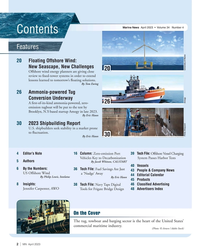 )
April 2023 - Marine News page: 2
)
April 2023 - Marine News page: 2Calendar By Philip Lewis, Intelatus By Eric Haun 45 Products 38 Tech File: Navy Taps Digital 8 Insights: 46 Classi? ed Advertising Jennifer Carpenter, AWO Tools for Frigate Bridge Design 48 Advertisers Index On the Cover The tug, towboat and barging sector is the heart of the
-
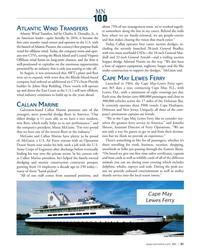 )
October 2022 - Marine News page: 31
)
October 2022 - Marine News page: 31Cape May Lewes Ferry like to consider our- new ? eet, which really helps us in our performance,” said selves the greatest ferry service in America,” said Jennifer the company’s president, Maxie McGuire. “I’m very proud Shivers, Assistant Director of Ferry Operations. “We are that we have one of the newest
-
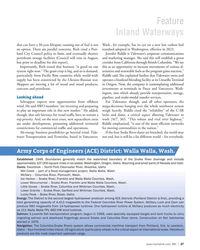 )
September 2022 - Marine News page: 37
)
September 2022 - Marine News page: 37are parallel concerns. Rich cited a Port- standard adopted in Washington, effective in 2023. land City Council policy to limit, and eventually shutter, Jennifer Riddle is Tidewater’s corporate communications petroleum storage facilities (Council will vote in August, and marketing manager. She said this will
-
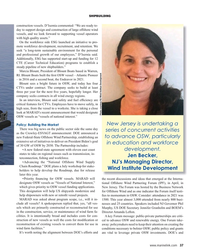 )
August 2022 - Maritime Reporter and Engineering News page: 37
)
August 2022 - Maritime Reporter and Engineering News page: 37ves- nesses and 25 countries. Speakers included NJ Governor Phil sels which are primarily constructed or reconstructed for use Murphy, US DOE Secretary Jennifer Granholm and BOEM’s in the construction, service, or maintenance of wind farm fa- Director Amanda Lefton. cilities. It is intentionally broad and
-
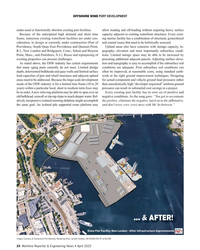 )
April 2022 - Maritime Reporter and Engineering News page: 24
)
April 2022 - Maritime Reporter and Engineering News page: 24platform may and don’t (ever, ever, ever) mess with Mr. In-between.” ... & AFTER! Images Courtesy of Connecticut Port Authority. Rendering Artist: Jennifer Gottlieb, AIA NCARB ENV SP at AECOM 24 Maritime Reporter & Engineering News • April 2022 MR #4 (18-33).indd 24 4/5/2022 10:03:53 A
-
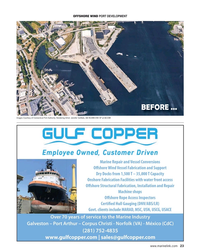 )
April 2022 - Maritime Reporter and Engineering News page: 23
)
April 2022 - Maritime Reporter and Engineering News page: 23OFFSHORE WIND PORT DEVELOPMENT BEFORE ... Images Courtesy of Connecticut Port Authority. Rendering Artist: Jennifer Gottlieb, AIA NCARB ENV SP at AECOM Marine Repair and Vessel Conversions Of shore Wind Vessel Fabrication and Support Dry Docks from 1,500 T – 35,000 T Capacity Onshore Fabrication Facilities
-
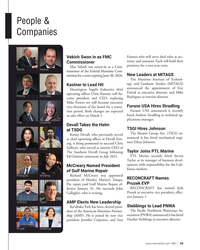 )
March 2022 - Marine News page: 43
)
March 2022 - Marine News page: 43c Northwest Waterways As- dent of the American Maritime Partner- ship (AMP). He is joined by new vice sociation (PNWA) announced it has hired president Jennifer Carpenter, and Sara Heather Stebbings as executive director. Pruzek Stebbings 43| www.marinelink.com M
